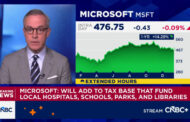-
The energy sector is volatile, but some companies are built to survive that volatility.
-
Chevron has a lofty yield and a long history of returning value to investors via dividend hikes.
-
TotalEnergies has a lofty yield and a business that is changing with the world around it.
Chevron (NYSE: CVX) is offering investors a 4.7% dividend yield today. TotalEnergies‘ (NYSE: TTE) yield is even higher at 6.3%. That compares to an energy industry average of just 3.5%. But lofty yields are just one reason to like Chevron and TotalEnergies. Here are a few more that may prompt you to buy one or both of these energy industry giants right now.
The one thing every investor needs to understand about the energy sector right up front is that it is inherently volatile. Oil and natural gas are commodities, and their prices swing widely and quickly. That’s why I prefer to invest in the energy sector via integrated energy stocks. Most conservative investors, and likely most income investors, should probably follow my lead.
Chevron and TotalEnergies basically have exposure to the entire value chain, from production to transportation, chemicals, and refining. Each segment of the industry operates a little differently, with the diversification across the sector helping to soften the fluctuations in energy prices. To be fair, commodity prices are still the driving force behind Chevron’s and TotalEnergies’ businesses and stock prices. But integrated energy companies tend to weather the swings better than pure-play drillers and chemical and refining companies.
That said, Chevron and TotalEnergies are not interchangeable. For example, Chevron has increased its dividend annually for 38 consecutive years. TotalEnergies hasn’t managed anything near that level of dividend consistency (more on TotalEnergies’ dividend below). Part of the reason for Chevron’s dividend success is its focus on operating with a strong balance sheet.
At the end of the first quarter of 2025, Chevron’s debt-to-equity ratio was roughly 0.2 times. That’s low for any company and is second-best among its closest peers. That gives management the leeway to take on debt during industry weak patches so it can continue to support its business and pay its dividend. When oil prices recover, as they always have historically, leverage is reduced in preparation for the next downturn.
For more conservative dividend investors, Chevron is a solid choice in the energy sector. There will be ups and downs, but the dividend is highly reliable.
That said, I own TotalEnergies. There are a couple of caveats here, though. First, U.S. investors must pay French taxes on the dividends collected, which reduces the actual income stream they’ll receive. Second, TotalEnergies has a history of investing more aggressively. That includes investments in politically volatile countries and, right now, in the development of clean energy. Chevron has largely stuck to its energy core.
The clean energy investments being made are why I’ve chosen to own TotalEnergies. Essentially, the French energy giant is using its carbon fuel profits to invest in the energy transition that is shifting the world more and more toward electricity. This is going to be a decades-long shift, and an all-of-the-above approach is likely to be the final solution on the energy front. However, I like that TotalEnergies is working on an all-of-the-above strategy right now.
What really sets TotalEnergies apart, however, is that it has made this transition without cutting its dividend (it has actually been increasing it annually of late). European peers BP and Shell announced similar plans and used the business shift to justify dividend cuts. Then, they both walked back their clean energy plans. TotalEnergies has, if anything, sped up its investments in the space.
In other words, TotalEnergies is executing well in a changing world, which is exactly why I want to own it for the long term.
The interesting thing about both Chevron and TotalEnergies is that oil prices have been relatively weak of late. And that has put downward pressure on each company’s shares, lifting their yields to fairly attractive levels. For more conservative dividend investors, Chevron is probably the better choice. But for investors like me who are willing to take on a little more risk to gain exposure to clean energy, TotalEnergies could be a good call right now, too.
Before you buy stock in Chevron, consider this:
The Motley Fool Stock Advisor analyst team just identified what they believe are the 10 best stocks for investors to buy now… and Chevron wasn’t one of them. The 10 stocks that made the cut could produce monster returns in the coming years.
Consider when Netflix made this list on December 17, 2004… if you invested $1,000 at the time of our recommendation, you’d have $687,764!* Or when Nvidia made this list on April 15, 2005… if you invested $1,000 at the time of our recommendation, you’d have $980,723!*
Now, it’s worth noting Stock Advisor’s total average return is 1,048% — a market-crushing outperformance compared to 179% for the S&P 500. Don’t miss out on the latest top 10 list, available when you join Stock Advisor.
*Stock Advisor returns as of July 7, 2025
Reuben Gregg Brewer has positions in TotalEnergies. The Motley Fool has positions in and recommends Chevron. The Motley Fool recommends BP. The Motley Fool has a disclosure policy.
Here Are My Top 2 High-Yield Energy Stocks to Buy Now was originally published by The Motley Fool














